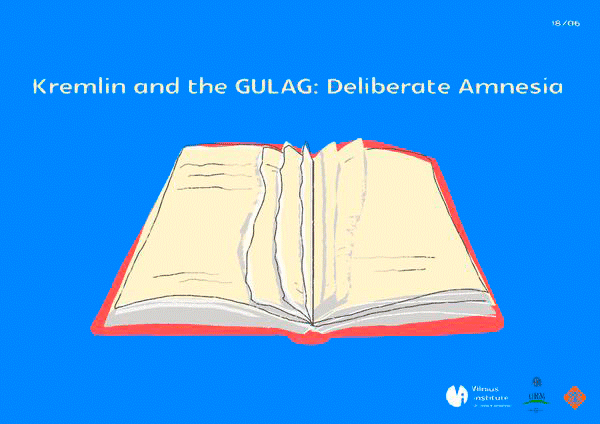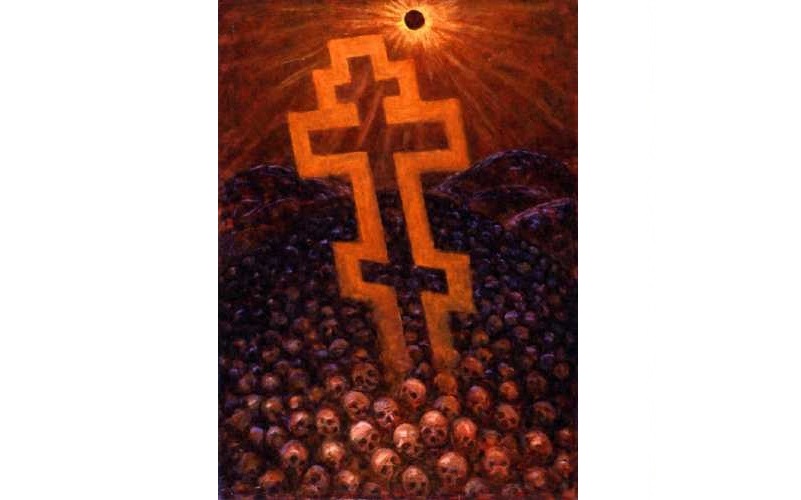Read also: Moscow secretly destroyed GULAG victims records in 2014
The classified order on “The effectuation of the order on centralized operational-clerical, criminal, records under investigation formed on the basis of the internal affairs of RF” was signed by the Russian Ministry of Internal Affairs, the Ministry of Justice, the FSB, the Foreign Intelligence Service (SVR), and a variety of other institutions. The document instructs that the files are to be destroyed once the former prisoner reaches the age of 80.
Sergei Prudovsky, one of the researchers at the museum of genocide, explained to Kommersant newspaper:
The criminal proceedings are preserved by the FSB (The Federal Security Service of the Russian Federation) or in the national archives. However, all of them end with the date of conviction and the sentence: execution or deportation to a concentration camp. The cases of execution are clear. But the information about the destinations of those who were convicted and as a sentence was sent to concentration camps: did they survive, were they transferred to another camp is only in the identification cards which are preserved by the Ministry of Internal Affairs. In the case when these cards are destroyed, that information is doomed to be forgotten.
Such actions on behalf of the Russian State are neither a coincidence nor simply a bureaucratic whim: these actions are part of a wider policy of erasing the memory of the Gulag that is being purposefully executed by Putin’s Russia. The oblivion of the victims of Gulag is not a passive process; the remembrance of the victims of the Gulag in the shape of memorials is minimal and the efforts of non-governmental organizations to preserve the stories of the victims of the Gulag are being actively obstructed.
When Putin was re-elected as a Russian President, condemnations of the organization Memorial, which opened a museum of political repression in the last existing forced labor camp in Perm, as an “anti-Russian” organization intensified.
In 2012 all of the NGOs that received financial support from abroad were made to register as “foreign agents.” This was the beginning of the downfall for the Memorial Museum in Perm. Not only did regular searches begin, the locals were encouraged not to cooperate with this organization, the government’s support was reduced and the taxes increased, but also while organizing a festival in 2013 Memorial was prohibited to invite guests from abroad. Next year the national channel NTV broadcasted a documentary which claimed that the goal of the Perm museum is to “teach the children that the Ukrainian fascists are not as bad as they are portrayed in the history books while their grandchildren are executing a genocide in Eastern Ukraine.” The orthodox priest that appeared in the program explained that “people like that do not have a motherland, because they are prepared to betray it anytime.” This is the reality that organizations which are trying to improve the lamentable situation of the memory of Gulag’s victims face.
The destruction of the only surviving documents which bear witness to the stories of the Gulag’s victims demonstrates that the Russian government seeks not only to preclude speaking about the already known stories but also to prevent historians and relatives from tracing the stories of those whose destinies are unknown to this day.
 The text is part of the project which is aimed at strengthening democracy and civil society as well as fostering closer ties with the EU Eastern Partnership countries (Ukraine, Moldova, Georgia) by spreading independent information with the help of contemporary solutions. The project is implemented by Vilnius Institute for Policy Analysis. It is financed as part of Lithuanian Ministry of Foreign Affairs‘ Development Cooperation and Democracy Promotion Program.
The text is part of the project which is aimed at strengthening democracy and civil society as well as fostering closer ties with the EU Eastern Partnership countries (Ukraine, Moldova, Georgia) by spreading independent information with the help of contemporary solutions. The project is implemented by Vilnius Institute for Policy Analysis. It is financed as part of Lithuanian Ministry of Foreign Affairs‘ Development Cooperation and Democracy Promotion Program.
Read also:
- ‘Putin’s GULAG more horrible than Stalin’s,’ researchers say
- 60 years ago this week, Ukrainians rose up against the Soviet GULAG at Kengir
- Moscow secretly destroyed GULAG victims records in 2014
- How UPA veteran Anna survived the “Russian world”
- Moscow closed GULAG museum
- Remembering Soviet atrocities: Solovki and Sandarmokh
- Ukrainians discover stories of repressed relatives in newly opened KGB archives
- Chief of Russia’s FSB: “Stalin-era repressions were largely justified”
- Newly opened Lviv museum of totalitarian regimes welcomes visitors
- Story of Frants Brzhezytsky, last Ukrainian survivor of Majdanek
- Russia was and remains a ‘prison of nations,’ Moscow writer says








